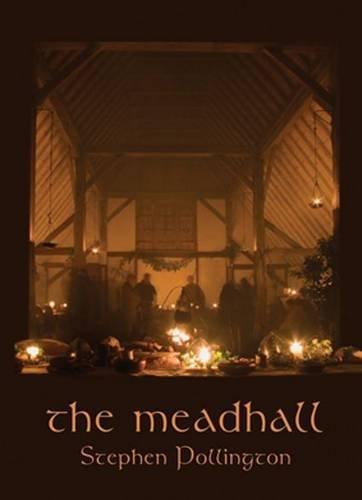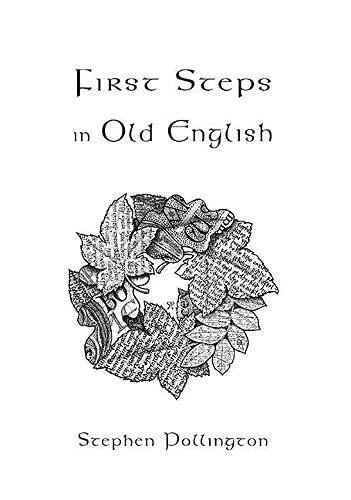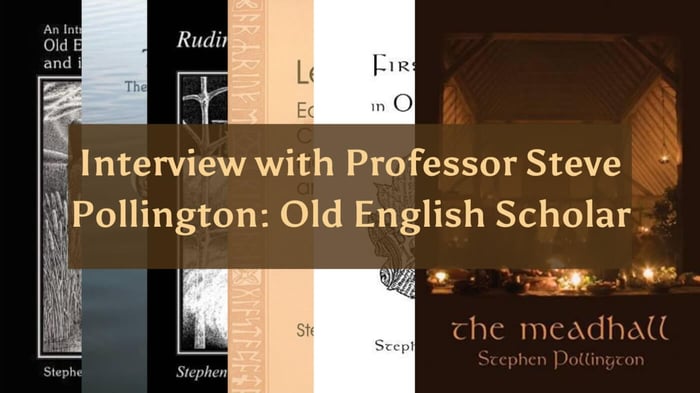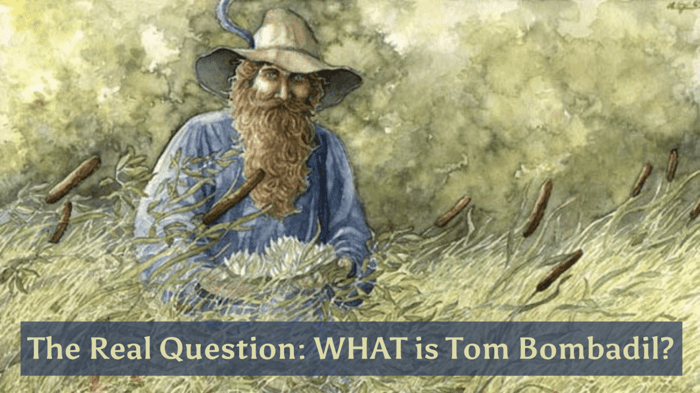We are huge fans of Professor Steve Pollington, author of more than a dozen works on Old English and Anglo-Saxon history. We are honored to offer many of Professor Pollington's works in our curated book collection.
We were finally able to (virtually) sit down with our friend to learn more about him, his history, and his love of Old English.
If you want to simply jump right in, you can find all of the books by Steve Pollington that we currently offer by clicking right here.
Professor Steve Pollington, tell us about yourself and your work.
I have been an author dealing with Anglo-Saxon England and the Old English language for more than 30 years now and I have been studying the languages and culture of northern Europe for nearly 50.
I live near Colchester, Essex, in the east of England; Colchester was the capital of Roman Britain until its destruction by Boudica in 61 AD. It sits in a historic landscape that has inspired many artists and writers.
My books are part of my long-term drive to spread knowledge of the AS. period, which also involves me in personal presentations, making audio recordings of texts, teaching the language with the City Literary Institute in London, and a host of other activities.
Tell us a little bit about how your passion for Old English and the Anglo-Saxon people got started.
I grew up in a small village in Essex called Thundersley: that name is from Old English and means ‘the woodland clearing dedicated to the god Thunor’ (the AS equivalent of the Norse Thor). The history of the area was written into the landscape in place names as well as roads and castles and churches.
I always loved our language and wanted to know why we say what we say, where words come from, and what they used to mean. I had an immense curiosity about the early history of the language, back through Shakespeare and Chaucer to the point where our language is so different that it no longer resembles our speech today - that point is about 1000 AD, but there are copious records that go back further, and it was to understand these that I undertook the study of Old English.
But I was also interested in languages generally, how they work, what they have in common, and how they change over time. The similarities between English and German or Dutch or Danish become intriguing in themselves when you start to look into them - and the reasons for the differences need to be understood too.
The Meadhall

$29.95
Communal meals were an important part of Anglo-Saxon society. They were enjoyed by nobles and yeomen, warriors, farmers churchmen and laity. Some of the feasts were informal communal gatherings (gebeorscipe) while others were formal ritual gatherings (symbel).Using the evidence of… read more
Do you prefer to call the language Anglo-Saxon or Old English (or do you not care either way)?
The language is Old English. The originating culture is Anglo-Saxon - the historical period, the art, the customs, the law, the people. They are not wholly interchangeable terms. When Bede wrote his church history he did so in Latin - the text is ‘Anglo-Saxon’ by culture and time but not as regards the language. Victorian writers often used ‘Anglo-Saxon’ to describe the language, in order to emphasize the difference between the ancient (Saxon) and the modern (English) languages. But the continuity from those days to our times is evident.
When Neil Armstrong stepped out onto the surface of the moon, he said “One small step for a man, one giant leap for mankind.” All those words were available when King Alfred ruled in the 880s - if the West Saxons had got their space programme together, they could have been spoken a thousand years earlier.
You are one of the most prolific writers on the Anglo-Saxon people and the Anglo-Saxon language, how do you decide what to cover next?
I often find that the subjects find me. I’ll be reading a book about e.g. warfare or medicine or law, and it will strike me that I don’t have a book about an aspect of the subject: perhaps the last time anyone wrote about it was in the 1950s and there have been many archaeological discoveries since then, or perhaps a new and valuable interpretation appeared as a footnote somewhere and deserves to be expanded and made better known.
The problem is of course that I often think of an idea for a book and before I can finish the research, someone beats me to it. There is not so big a demand for Anglo-Saxon books that the market will stand two new treatments overlapping in their scope. So if I don’t get my book out first, I have to put the project on hold in the hope that I can use the research later. Often I find I can.
Is there one passage in Old English that you particularly love that you wish everyone knew?
I do love that passage in the poem The Wanderer that describes the finest qualities of the wise man. It begins “wita sceal geðyldig…” (a wise man must be patient) and goes on to describe the need to be cautious in speech and bold in action. It is a fantastic set of good advice expressed in memorable alliterative verse.
If you had to convince someone in just a few sentences that they should study Old English, what would you say?
Anyone who has any curiosity at all about the modern language will need to know the old one. What is the relationship between the words ‘bite’, ‘bitter,’ and ‘beetle?' ‘Seethe,’ and ‘sodden?’ ‘Slow,’ and, ‘sloth?' These are all related words from Old English, and a knowledge of it reveals their true natures. Once you start down this path, it is very hard to turn back, and finding out these links takes on a life of its own.
First Steps in Old English

$22.95
$24.95
If you want to teach yourself Anglo-Saxon / Old English this is the book for you!A complete, well presented and easy to use Old English language course which contains all the exercises and texts needed to learn Old English. This… read more
Of the many projects you’ve gotten to work on over the years, what are some of your most memorable moments?
I have done a few TV appearances which have involved me being in some remarkable places. I have enjoyed a Yuletide feast in a wooden hall in the woods, with snow on the ground and wolves howling outside, while the fire crackled and the beer flowed. I have trodden a path through dewy woodland at dawn with a spear over my shoulder. I have spent a whole weekend in a timber house scripting a drama based around the year 1000 AD.
I have sat among several hundred ‘warriors’ enjoying food and drink around campfires, singing old songs and telling old tales. Ancient earthworks, churches, castles, burial mounds, and cathedrals have all been the backdrop to presentations by me and my companions
Where can we find you? And what are you working on now?
I live near Colchester in Essex, and seldom have to travel out to London these days. My teaching is mostly over Zoom. I still put in the occasional appearance in costume at historic sites, as well as day schools and the like in modern clothing.
I have plans to revise and re-issue some of my books as well as finish a long-term project in the near future although I can't say too much about that till the dust settles.
So now that you're fully convinced that you need to start studying Old English immediately, head over to Steve Pollington's collection on our site and pick up a few books. And nothing helps grasp Old English cases and declensions like cases of mead!





